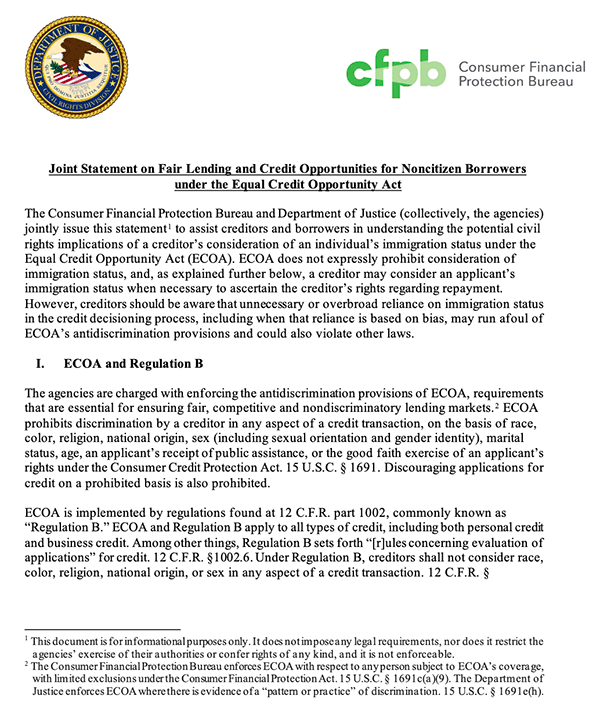Why Haven’t Loan Officers Been Told These Facts?
HUD Clarifies Civil Rights Protections Against Housing
Discrimination on the Basis of Shared Ancestry or Ethnic Characteristics
FOR RELEASE
Thursday, September 28, 2023
WASHINGTON – Today, the U.S. Department of Housing and Urban Development (HUD) and seven other agencies across the federal government are for the first time clarifying in writing that
Title VI of the Civil Rights Act of 1964 prohibits antisemitism, Islamophobia, and related forms of discrimination. In addition to shared ancestry and ethnic characteristics, religion is also a protected class under the Fair Housing Act, which HUD will continue to vigorously enforce. Today’s announcement is the latest step of the Biden-Harris Administration’s historic U.S. National Strategy to Counter Antisemitism, released in May 2023.
“Antisemitism, Islamophobia, and any other form of hate have no place anywhere, including in the home,” said HUD Secretary Marcia L. Fudge. “No one should be discriminated against because of their ancestry or ethnic characteristics or their faith or beliefs. Today’s announcement
will further the Biden-Harris Administration’s commitment to combating discrimination in all its forms and guide our partners on the ground to enforce this country’s legal protections for Americans against acts of hatred.”
“The fact sheet we are releasing today sends a strong message that discrimination on the basis of shared ancestry or ethnic characteristics is illegal under the Civil Rights Act,” said Demetria McCain, HUD’s Principal Deputy Assistant Secretary for Fair Housing and Equal Opportunity. “This announcement is in line with HUD’s continued commitment to combat housing discrimination in all forms. It informs those who call America home of their right to be treated equally regardless of their shared ancestry or ethnic characteristics–putting us one step closer to building a housing system
that prioritizes fairness and equality.”
In addition to today’s announcement, HUD continues to contribute to the implementation of the Biden-Harris Administration’s National Strategy to Counter Antisemitism. In May, HUD issued a
letter to 200 federally-funded housing programs on how to identify and counter antisemitism, Islamophobia, and related forms of bias and discrimination in housing. In addition, HUD is hosting a listening session in October for young adults to focus on fair housing rights, specifically related to protections on the basis of religion and shared ancestry and ethnic characteristics.
Today, HUD joins seven other federal agencies — the Departments of Agriculture, Health and Human Services, Homeland Security, Housing and Urban Development, Interior, Labor, Treasury, and Transportation — to clarify how this law prohibits antisemitism, Islamophobia, and other
forms of discrimination.
HUD’s Office of Fair Housing and Equal Opportunity (FHEO) works diligently to enforce the Fair Housing Act and Title VI of the Civil Rights Act of 1964. For more information, see the White House press release on today’s announcement and HUD’s new fact sheet on Title VI.
HUD’s Title VI Fact Sheet – Protecting Persons from Housing Discrimination Based on Actual or Perceived Shared Ancestry or Ethnic Characteristics
Do you have a great value proposition you’d like to get in front of thousands of loan officers? Are you looking for talent?

BEHIND THE SCENES – CFPB and Justice Department Issue Joint Statement Cautioning that Financial Institutions May Not Use Immigration Status to Illegally Discriminate Against Credit Applicants
Borrowers report being denied loans because of their immigration status.
OCT 12, 2023
WASHINGTON, D.C. – The Consumer Financial Protection Bureau (CFPB) and Justice Department today issued a joint statement that reminds financial institutions that all credit applicants are protected from discrimination on the basis of their national origin, race, and other characteristics covered by the Equal Credit Opportunity Act, regardless of their immigration status. The CFPB and Justice Department are issuing this statement because consumers have reported being rejected for credit cards as well as for auto, student, personal, and equipment loans because of their immigration status, even when they have strong credit histories and ties to the United States and are otherwise qualified to receive the loans.
While the Equal Credit Opportunity Act allows a creditor to consider an applicant’s immigration status when necessary to ascertain the creditor’s rights regarding repayment, creditors should be aware that unnecessary or overbroad reliance on immigration status, including when that reliance is based on bias, may run afoul of the law.
“Fair access to credit is crucially important for building wealth and strengthening household financial stability,” said CFPB Director Rohit Chopra. “The CFPB will not allow companies to use immigration status as an excuse for illegal discrimination.”
“Lenders should not deny people the opportunity to take out a loan to buy a home, build their businesses or otherwise pursue their financial goals because of unlawful bias and without regard to their actual ability to repay,” said Assistant Attorney General Kristen Clarke of the Justice Department’s Civil Rights Division. “This guidance reminds lenders that denying someone access to credit based solely on their actual or perceived immigrant status may violate federal law.”
Some financial institutions have maintained blanket policies denying credit to individuals based on their immigration status, regardless of their personal circumstances and demonstrated ability to repay, arguing that the Equal Credit Opportunity Act, and the regulation that implements it, protect them whenever they consider immigration status in making a credit decision. Others have incorrectly claimed that the Act shields lenders from liability under other federal and state civil rights laws that bar discrimination on the basis of someone’s status as an immigrant or noncitizen.
The joint statement explains that while the Equal Credit Opportunity Act allows creditors to consider immigration status when necessary to ascertain the creditor’s rights regarding repayment, unnecessary or overbroad reliance on immigration status may violate the Act’s prohibition of discrimination on the basis of national origin, race or another prohibited basis. The joint statement also confirms that neither the Equal Credit Opportunity Act nor its regulations provide companies a safe harbor with respect to other laws barring discrimination on the basis of immigration status.
Business or Legal Reasons Only – From the Joint Statement
“if a creditor requires documentation, identification, or in-person applications only from certain groups of noncitizens, and this requirement is not necessary for assessing the creditor’s ability to obtain repayment or fulfilling the creditors’ legal obligations, that policy may violate ECOA and Regulation B by harming applicants on the basis of national origin or race.”
“While Regulation B describes certain conditions under which creditors may consider immigration
status, creditors should remain cognizant that ECOA and Regulation B expressly forbid
discrimination on the basis of certain protected characteristics, including race and national origin.
Immigration status may broadly overlap with or, in certain circumstances, serve as a proxy for
these protected characteristics. Creditors should therefore be aware that if their consideration of
immigration status is not “necessary to ascertain the creditor’s rights and remedies regarding
repayment” and it results in discrimination on a prohibited basis, it violates ECOA and Regulation
B.”
Avoiding Inadvertent Mortgage Discrimination with Non-U.S. Citizens
How do lenders find themselves non-compliant with ECOA and the Fair Housing Act surrounding credit decisions and immigration status? What is required for lawful business decisions when interacting with persons or communities without permanent residency or citizenship? Look for the coming article on compliant interactions with non-U.S. citizen borrowers.

Tip of the Week – The Art of Communication: Practice, Practice, Practice
In a recent article, CNBC featured a few excerpts from the book, “I Have Something to Say – Mastering the Art of Public Speaking in an Age of Disconnection” by author John Bowe.
How You Say It Should Not Sacrifice The Words You Say
The author asserts that it matters not only how you say it but also what you say.
Without a doubt, a warm tone and a smile can effectively convey a message. But the words you use matter, too.
Dangerous Number Seven
In our current age, the author’s number 7 is dicey. Note that the author’s complimentary number 7 focuses on apparel, not the person. Generally, complimenting someone’s shoes or hat may be appropriate for a business environment. However, telling a person they look fine is not the same. Stay on the right side of the line.
Better than comments about a spiffy pair of shoes, try sincere compliments about a person’s accomplishments or what they bring to the job. Expressing appreciation for a job well done is always in good form.
The Virtue and Wisdom of Number Nine
Number 9 is similar to my mother’s favorite, “If you don’t have anything nice to say, say nothing at all.”
Another vote for the silent treatment, often attributed to Abraham Lincoln: “Better to remain silent and be thought a fool than to speak and to remove all doubt.”
Even better: Proverbs 17:28 Even a fool, when he holdeth his peace, is counted wise: and he that shutteth his lips is esteemed a man of understanding.
See the link to Mr. Bowe’s CNBC article below and discover how he suggests leveraging these words.
Maybe you currently use some of these phrases. If not, try inserting a few into your conversations.
- “What I’m hearing you say is …”
- “You may be right.”
- “You were right, I was wrong.”
- “Thank you for doing this …”
- “I’ll leave you to it.”
- “Can you help me with something?”
- “Your [hair/shirt/tie, etc.] looks so nice today!”
- “That’s interesting.”
- Say nothing at all.
See John Bowe’s book and website here: I Have Something to Say – Mastering the Art of Public Speaking in an Age of Disconnection
See the CNBC article here: If you use any of these 9 phrases, you have ‘better etiquette skills’ than most: Public speaking expert.
